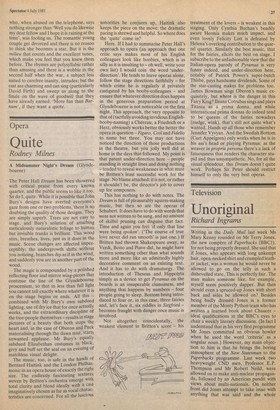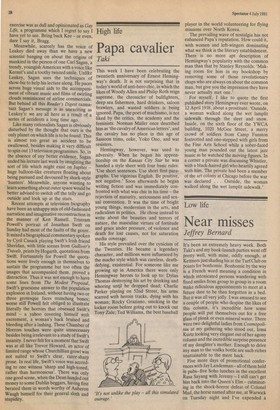Television
Unoriginal
Richard Ingrams
Writing in the Daily Mail last week Ms Mary Kenny rounded on Mr Terry Jones, the new compere of Paperbacks (BBC1), for not being properly dressed. She said that if Jones, who appears with long unkempt hair, open-necked shirt and crumpled leather jacket, was a woman he would never be allowed to go on the telly in such a dishevelled state. This is perfectly fair. The man makes someone like, for example, myself seem positively dapper. But then should even a spruced-up Jones with short back and sides be allowed on? Besides being badly dressed Jones is a former member of the Monty Python team who has . written a learned book about Chaucer — ideal qualifications in the BBC's eyes to chair a weekly literary discussion. (In fact I understand that in his very first programme Mr Jones committed an obvious howler when he used the word 'criteria' as a singular noun.) However, my main objection to him is that he brings the boring atmosphere of the New Statesman to the Paperbacks programme. Last week two heavyweight CND men, Professor E.P. Thompson and Mr Robert Neild, were allowed on to make anti-nuclear propaganda, followed by an American pundit with views about multi-nationals. On neither front did Jones attempt to take issue with anything that was said and the whole exercise was as dull and opinionated as Gay Life, a programme which I regret to say I have yet to see. Bring back Kee — or even, dare I say it, Bragg.
Meanwhile, scarcely has the voice of Leakey died away than we have a new scientist banging on about the origins of mankind in the person of one Carl Sagan, a trendy, youngish American with a voice like Kermit's and a toothy twisted smile. Unlike Leakey, Sagan uses the techniques of show-biz to help his lecture along. He paces across huge visual aids to the accompaniment of vibrant music and films of swirling clouds reminiscent of airline commercials. But behind all this Reader's Digest razmatazz Sagan's message is as unexciting as Leakey's: we are all here as a result of a series of accidents a long time ago.
Like many rationalists Sagan is obviously disturbed by the thought that ours is the only planet on which life is to be found. This is almost too great an accident to be swallowed, besides making it very difficult to spin out 13 television programmes. So, in the absence of any better evidence, Sagan ended his lecture last week by imagining the sort of life which might exist on Jupiter — huge balloon-like creatures floating about being pursued and devoured by shark-style 'hunters'. Meanwhile, anyone wanting to learn something about outer space would be better advised to switch off the telly and go outside and look up at the stars.
Recent attempts at television biography have been an unhappy mix of old-fashioned narration and imaginative reconstruction in the manner of Ken Russell. Tristram Powell's portrait of Jonathan Swift on Sunday had most of the faults of the genre. It mixed a biographical commentary spoken by Cyril Cusack playing Swift's Irish friend Sheridan, with little scenes from Gulliver's Travels, prints by Hogarth, quotations from Swift. Fortunately for Powell the quotations were lively enough in themselves to sustain the programme but too often the images that accompanied them, proved a distraction. Thus it was not enough to have some lines from The Modest Proposal, Swift's gruesome answer to the population explosion in Ireland, without having two or three grotesque faces munching bones; worse still Powell felt obliged to illustrate literally the horrors that obsessed Swift's mind — a yahoo covering himself with excrement, a woman's back bruised and bleeding after a lashing. These Chamber of Horrors touches were quite unnecessary besides being irrelevant to a study of Swift's insanity. I never felt for a moment that Swift was at all like Trevor Howard, an actor of limited range whose Churchillian growl was not suited to Swift's clear, razor-sharp prose. In real life, Swift's voice was according to one witness 'sharp and high-toned, rather than harmonious'. There was only one good scene, when the Dean handed out money to some Dublin beggars, having first berated them in words worthy of Auberon Waugh himself for their general sloth and stupidity.







































 Previous page
Previous page